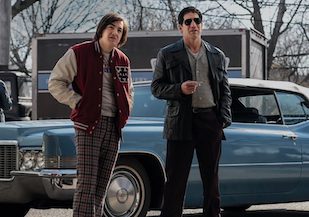|
|
Review: The Many Saints of NewarkBy Matthew HuntleyOctober 10, 2021
Other well-known “Sopranos” characters appearing as 30-years younger versions of their series counterparts are Paulie Walnuts (Billy Magnussen) and Silvio Dante (John Magaro). And even though she has no say in how the DiMeo operations run, Tony’s mother, Livia (Vera Farmiga), certainly speaks her mind, and just as the screenplay does for Giuseppina as far as allowing space for a distinct female character, Livia has many scenes that give her extra dimension and provide insight into why her and Tony’s relationship became so tenuous later. There’s also Tony’s older sister, Janice (Mattea Conforti, Alexandra Intrator), whose confirmation reception becomes a seminal event for Tony because it’s one of the first times he witnesses his Uncle Dickie and other DiMeo members interacting and speaking as criminal cohorts. Tony becomes privier to their role in illegal activities, such as gambling and drug trafficking, and takes their lead to start his own betting scheme at school. Once the characters are established, the engine driving the plot stems mostly from the Newark riots of 1967, when African-Americans started protesting the racial inequality that was systemic in the city. The riots were particularly inflamed after two white police officers allegedly beat a Black driver to death. This incident affects Dickie indirectly because his Black associate, Harold McBrayer (Leslie Odom Jr.), decides, as a Black man, to take up the Black cause and leverage the riots to form his own mob. He eventually becomes Dickie’s chief rival, and their evolving resentment toward each other leads to the movie’s pointed scenes of violence, which include shootouts and shadowed assassinations. Meanwhile, in accordance with the genre, familial tensions abound; arrests occur; affairs take place; loyalties get tested; bodies get burned; and a despondent Dickie seeks the guidance of his incarcerated Uncle Sally (also played by Liotta), his father’s twin. Standing in Dickie’s shadow and absorbing all the physical and emotional commotion is an adolescent Tony (Michael Gandolfini, son of James), and what he sees, hears, and tries to process is what we’re obviously supposed to believe became integral to his adult disposition. And just in case we forget he’s Tony Soprano, future mob boss, we see Tony committing his own transgressions, such as hijacking an ice cream truck and asking Dickie to steal medication for his mother. When I mentioned “The Many Saints of Newark” could have been done better, I was specifically referring to the idea that its events and developments, while interesting and captivating enough, feel overly safe and routine. For the record, what transpires isn’t dull or without substance, but nevertheless, the filmmakers don’t veer too far outside their comfort zones or take the kind of chances that might have allowed “Saints” to distinguish itself beyond the conventional mob drama. It stays within its genre’s limits and makes us believe one of the filmmakers’ prerogatives was to not rock the already secure “Sopranos” boat, perhaps out of their wanting to not only lure in new fans but to also not potentially upset pre-existing ones. As a result, the film gives us what we expect, but not much else. Yes, we do gain more insight into Tony’s upbringing; yes, we do come to appreciate how growing up around such chaos and uncertainty can likely have rippling effects; and yes, the content feels important and relevant. But “The Many Saints of Newark” never quite reaches the status of “essential viewing.” It’s good and watchable, and the performances are strong, especially Nivola, Odom Jr., and Farmiga, but it’s not the type of “Sopranos Story” one would ever feel the need to re-watch. This is unfortunate, because it’s precisely this latter quality that has attached itself to the show and would ideally attach itself to any great film. Overall, I recommend “The Many Saints of Newark” because it works as satisfying entertainment, but in a better world, it would have dived deeper into its subjects. As it is, we feel it only skims the surface on things such as Dickie’s guilt; the Newark riots; Harold’s motivations for wanting to form his own crew; Livia’s psychosis; and what exactly was going through Tony’s head as all this upheaval was taking place around him. As it is, we only get glimpses into these matters, and even though they’re adequate glimpses, we can’t help but feel mildly betrayed by the filmmakers not digging into them more. Maybe they’re waiting for the next “Sopranos Story” to do this, but before they make it, they should really think about what it is about the show that keeps viewers coming back to it after all these years and then try to make a movie that has the same effect. I’m sure it wouldn’t be easy, but they should try.
|

|
|
|

|
Thursday, October 31, 2024
© 2024 Box Office Prophets, a division of One Of Us, Inc.


